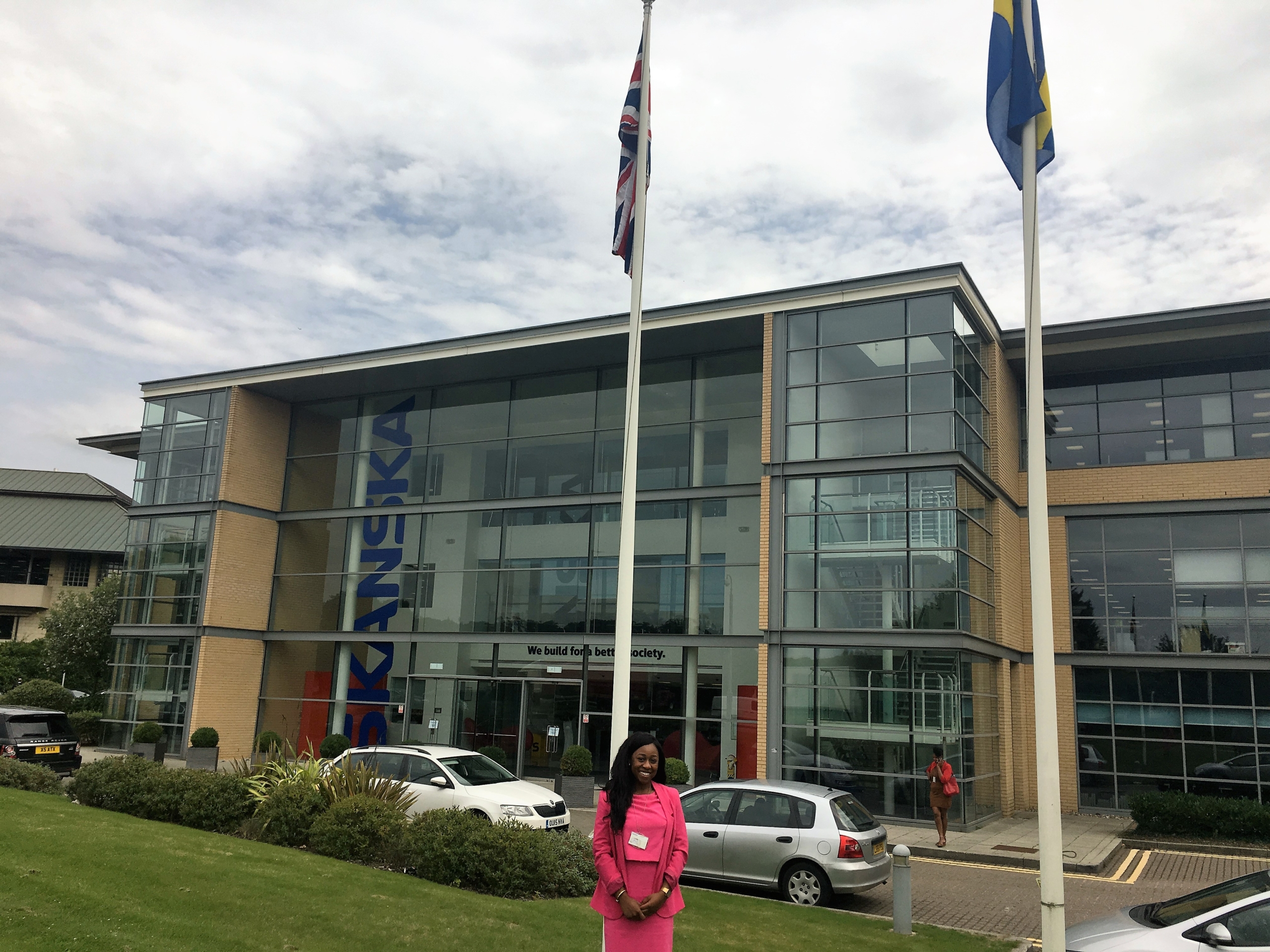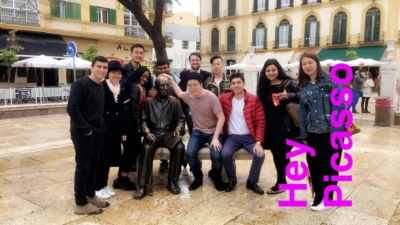Putting theory into practice: the Master’s in Management three-month internship…
23/08/2017

What is the organisational culture like?
The organisational culture in Skanska is rather relaxed, which I absolutely love. I think it comes from Sweden’s rather easy-going approach to life and that is reflected in the office here. The company is concerned about employees’ wellbeing, social life and health, which I really admire. With the art and slogans that decorate the office (such as “We build for a better society”) they are very focused on sustainability and green ethical solutions. That is also evident from the projects, clients and suppliers they work with and even down to the sort of food served in the canteen.
What has been the biggest challenge?
The biggest challenge for me has been immersing myself into the company and getting to grips with the project itself. When I first started, I found it difficult to understand what exactly was going on, as a lot of the information I learnt was new and highly technical. This made me feel rather useless; however as I learnt more about the project and got more comfortable with the team I gained more confidence. Another challenge I must add was getting used to the hour and a half long drives on the M1 into work!
How are decisions made?
Skanska as a company are very into equality, again reflecting from the Scandinavian origins, and this is reflected on their approach to decision making. Almost all decisions go through Steering and Action Teams and Senior and Executive management. Everyone is involved. This could slow down the decision making in general but I like how everyone knows what everyone is doing and the projects people are involved in. As big as the company is, the communication is fantastic and people know what decisions have been made at appropriate times.
How do teams work within the organisation?
Teams work well within the organisation. People know their duties and functions of the teams they belong to and work accordingly. It is also common practice for employees to work within different teams for the benefit of the company as a whole.
What have you learned?
I have learnt a lot theoretically and practically, from simple business etiquette to complex change management strategies and IT systems. I was also able to learn about what I want and do not want in my future business career.
What do you think are the benefits of internships in a large organisation?
I think the benefits of interning in a large organisation such as Skanska is the diversity. I have met so many employees and other interns from different academic backgrounds and lifestyles that have expanded my view of the corporate life and world in general. With all the people I have met, I have been able to really shape and mould the goals and aspirations I want in my own life.
How have you found your year at Cranfield?
I have found my year in Cranfield really rewarding. I loved meeting people from different nationalities and academic backgrounds as well as having experienced lecturers who know their subject matter and industry. I feel like I know a lot more about different companies, industries, economies and even cultures. I have been able to push myself outside of my comfort zone and met lifelong friends.
What has been the best experience of your Master’s in Management course?
 Undoubtedly, the best experience of my Master’s course has been the internship. The fact that I had this opportunity from the university as part of the Master’s in Management course is great and has strengthened my character, work ethic, academic knowledge (and finances too!) Additionally, I have to mention when we went to Spain for the Effective Cross-cutural Engagement module. Immersing myself into a different culture was a great and memorable experience that I am so glad I got to be a part of.
Undoubtedly, the best experience of my Master’s course has been the internship. The fact that I had this opportunity from the university as part of the Master’s in Management course is great and has strengthened my character, work ethic, academic knowledge (and finances too!) Additionally, I have to mention when we went to Spain for the Effective Cross-cutural Engagement module. Immersing myself into a different culture was a great and memorable experience that I am so glad I got to be a part of.
Why do you think the internship is important?
I think the internship is important because it gives you real-life work experience. A lot of us on the course had limited work experience or even knowledge of management concepts, so having this really helped broaden our knowledge and understanding of what we have learnt in the classroom. It is also important because it helps you reflect on what you have learnt in a practical setting to reinforce teaching and self-awareness of what you can and cannot (yet) do.
What skills from the MSc have you applied during your internship so far?
I have used my team-working and team-building skills from my MSc and applied them within my internship massively, due to the nature of the project I am working on and the great emphasis the Cranfield course has on teamwork. The research skills I have picked up have helped me generate more ideas for the team as we collectively work together. Certain theories I have learnt during my MSc have also helped enhance certain skills too; for example understanding organisational culture, which has helped me be more adaptable and flexible in this new environment.
What are your aims and goals for the future? How do you think your time at Cranfield will help you achieve those?
One of my goals in life is to own my own Public Relations company in the future. With the knowledge I have gained from my time in Cranfield, I believe I have the tools, techniques and contacts to help make that happen. I have more of an understanding of firms and industries that can help point me in the direction I believe will suit me and what the market needs are in the future. I strongly believe Cranfield and this master’s has really provided me with the skills, knowledge and platform for me to explore different companies and industries before I truly understand what I want. Later on in life, I would really love to do a PhD and maybe become a lecturer at a university. I believe Cranfield has provided me with the stepping stone to help reach that dream.
—
Find out more about the Cranfield Master’s in Management…
Categories & Tags:
Leave a comment on this post:
You might also like…
From classroom to cockpit: What’s next after Cranfield
The Air Transport Management MSc isn’t just about learning theory — it’s about preparing for a career in the aviation industry. Adit shares his dream job, insights from classmates, and advice for prospective students. ...
Setting up a shared group folder in a reference manager
Many of our students are now busy working on their group projects. One easy way to share references amongst a group is to set up group folders in a reference manager like Mendeley or Zotero. ...
Company codes – CUSIP, SEDOL, ISIN…. What do they mean and how can you use them in our Library resources?
As you use our many finance resources, you will probably notice unique company identifiers which may be codes or symbols. It is worth spending some time getting to know what these are and which resources ...
Supporting careers in defence through specialist education
As a materials engineer by background, I have always been drawn to fields where technical expertise directly shapes real‑world outcomes. Few sectors exemplify this better than defence. Engineering careers in defence sit at the ...
What being a woman in STEM means to me
STEM is both a way of thinking and a practical toolkit. It sharpens reasoning and equips us to turn ideas into solutions with measurable impact. For me, STEM has never been only about acquiring ...
A woman’s experience in environmental science within defence
When I stepped into the gates of the Defence Academy it was the 30th September 2019. I did not know at the time that this would be the beginning of a long journey as ...






